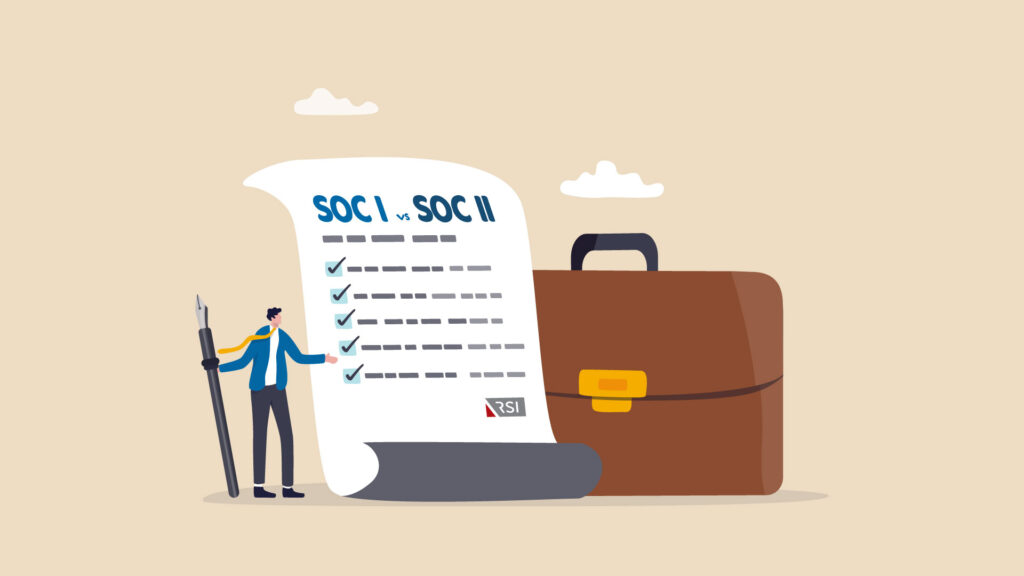Understanding AICPA Audits and Attestations: SSAE 16, SOC 1 vs SOC 2, and Other Standards
AICPA Audits and Attestations 101
The American Institute of Certified Public Accountants (AICPA) publishes regulatory frameworks guiding how financial, security, and other audits are conducted. Which standard applies depends on your industry and client requirements.
Key points to understand:
- The regulatory context of AICPA’s Statement on Standards for Attestation Engagements (SSAE)
- Differences between SOC 1 vs SOC 2 vs SOC 3
- Type 1 vs Type 2 SOC audits
- Partnering with a compliance advisory service helps ensure SOC 2 compliance efficiently
SSAE 16 and SSAE 18 Standards
The AICPA introduced SSAE 16 in 2010 as the successor to SAS 70 (1992). In 2016, SSAE 18 superseded SSAE 16. Both standards unify auditing practices for service organizations.
The SOC system was released in 2011 alongside SSAE 16. Many auditors and clients still refer to SOC audits as SSAE 16 reports.
The exact audit required depends on your business model, the type of data processed, and client expectations.
SOC 1, SOC 2, and SOC 3 Compliance
SOC audits are fully-fledged AICPA auditing standards for specific use cases:
- SOC 1 – Focused on financial services organizations and internal control over financial reporting (ICFR).
- SOC 2 – Applies to all service organizations, assessing adherence to the Trust Services Criteria (TSC).
- SOC 3 – Similar to SOC 2 but intended for public use and general audiences.
Understanding which SOC report is required, along with the Type (1 or 2), is critical for achieving SOC 2 compliance. Some organizations may need multiple audits.
SOC 1: Internal Control over Financial Reporting
A SOC 1 report measures an organization’s ICFR. Audits focus on financial information and may include IT controls, governance, and communication systems.
- Reports are tailored to each organization and its clients.
- Often referred to as SSAE 16 reports.
- Intended for specialized audiences such as auditors and clients, not the general public.
SOC 2: Trust Services Criteria (for Technical Audiences)
SOC 2 compliance applies to service organizations of all kinds, especially B2B or SaaS companies. It ensures organizations meet the Trust Services Criteria (TSC):
- Security – Protects sensitive information from unauthorized access or incidents.
- Availability – Ensures critical systems are accessible even during disruptions.
- Processing Integrity – Confirms data is processed accurately and completely.
- Confidentiality – Restricts access to sensitive data to authorized users only.
- Privacy – Safeguards personally identifiable information (PII) with strict access controls.
SOC 2 reports are intended for specialized audiences, providing assurance to auditors and clients.
SOC 3: Trust Services Criteria (General Use Report)
SOC 3 reports use the same TSC framework as SOC 2 but are designed for public consumption. Organizations often use SOC 3 reports for marketing or public relations.
Many companies complete a SOC 3 report alongside a SOC 2 Type 2 audit, which strengthens both public messaging and private client assurance.
Additional SOC varieties exist for specific industries, such as SOC for Cybersecurity or SOC for Supply Chain.
Conducting a Type 1 or Type 2 SOC Audit
Organizations must also choose a Type for SOC 1 or SOC 2 audits:
- SOC Type 1 – Evaluates the design of controls at a specific point in time.
- SOC Type 2 – Evaluates the effectiveness of controls over time, providing higher assurance.
SOC 3 reports do not have a Type designation, but their scope aligns with Type 2, focusing on practical control effectiveness.
Streamline Your AICPA Compliance Today
Meeting AICPA auditing standards begins with understanding which audits your organization needs:
- Financial organizations generally require a SOC 1 report.
- Other service providers often need SOC 2 and/or SOC 3.
- Determine if a Type 1 or Type 2 report is needed; Type 2 is more rigorous and offers the most assurance.
RSI Security helps organizations prepare for and complete SOC audits efficiently, with deep expertise in SOC 2 compliance. We focus on upfront discipline to ensure long-term growth and audit success.
Learn more about RSI Security’s SOC 2 compliance services and get started on your audit preparation today.
Download Our SOC 2 Checklist
